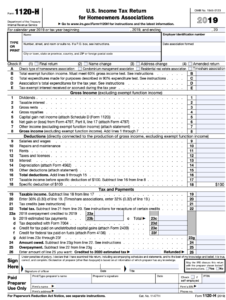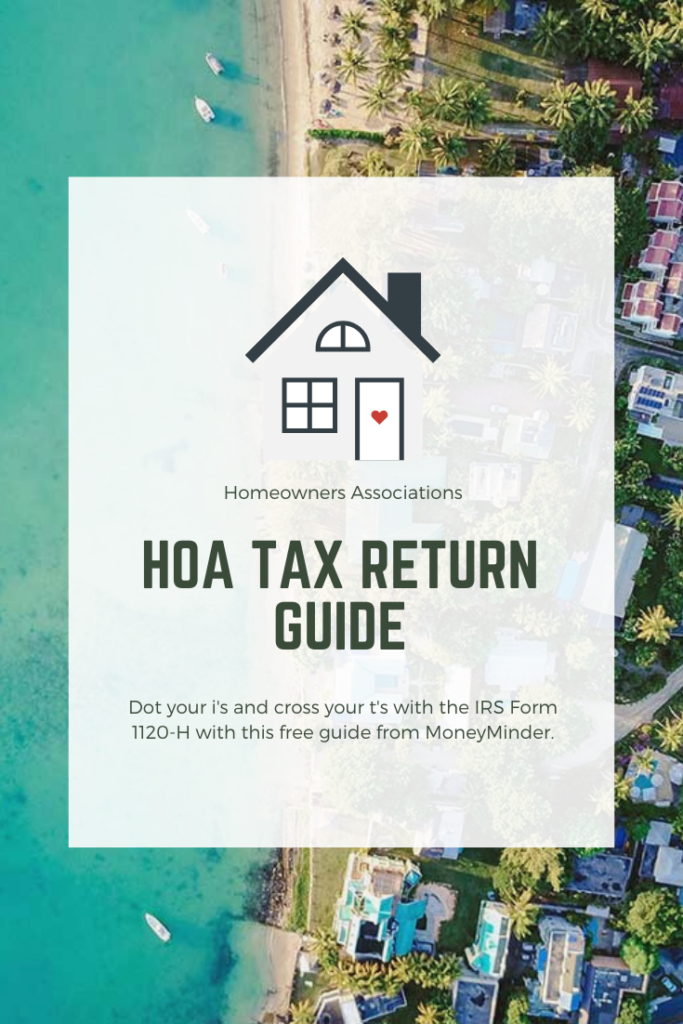Have you been charged with filing taxes for your Homeowners Association? In general, HOAs don’t pay taxes because they don’t have a profit. In other words, the income that comes in (membership dues, fees, assessments) is used on the usual maintenance stuff and it’s all a wash. However, HOAs must still file a federal tax form with the IRS. This HOA tax return guide should include everything you need to know in easy-to-understand terms.
HOA Tax Return Form: 1120-H

In order to take advantage of tax benefits on your HOA tax return, proper completion of the IRS Form 1120-H is essential. This form must be filled out annually according to the due dates below.
MoneyMinder HOA Accounting users can find the form 1120-H for the current year under the Tax Forms icon. Once complete, you can also upload any tax paperwork, filings, receipts, etc. under the Documents icon so it’s at your fingertips. This comes in handy as new treasurers transition in.
For non-MoneyMinder users, here is a link to the form 1120-H for the 2019 calendar year.
A Few Things You’ll Need to Fill Out Form 1120-H
Define Your HOA
The IRS has three main categories of Homeowners Associations. It should be simple for you to determine where your HOA falls:
- A condo association (COA)
- A residential real estate management association (HOA)
- A timeshare association
Key Info to Have Handy
- Your Employee Identification Number (EIN)
- Date the association was formed
- Detailed Gross Income numbers including Dividends, Taxable interest, Gross rents and royalties, etc.
- Detailed Deductions including Salaries, Repairs, Rents, Interest, etc.
Total Exempt Function Income

According to the IRS, at least 60% of the gross income reported on your HOA tax return must consist of exempt function income, defined as membership dues, fees or assessments. These dues and assessments could be made for anything from paying real estate taxes to trash removal. This income must come from the members as owners of the HOA.
Expenditures
At least 90% of your Homeowners Association’s expenditures must be used to “acquire, build, manage, maintain, and care for the property”.
HOA Tax Rate
As mentioned above, most HOAs don’t pay federal income tax. If this is not the case, your taxable income is taxed at a flat rate depending on organization type:
- COA – 30%
- HOA – 30%
- Timeshare Association – 32%
Form 1120-H Due Date
Your HOA must file Form 1120-H by the 15th day of the 4th month after the tax year ends. If your tax year ends December 31st, your form is due April 15th. There are two exceptions to this. First, if your HOA’s tax year end in June, the due date with be the 15th day of the 3rd month after the tax year ends. Second, if the due date falls on a weekend or holiday, the due date is the following M-F business day.
Who Signs the HOA Tax Return
Your return needs to be signed by an association officer authorized to do so. This could be:
- President
- VP
- Treasurer
- Assistant Treasurer
- Accounting Officer
If your HOA has Never Filed a Tax Return
Many HOAs don’t realize they have to file taxes. This is likely because, as previously mentioned, they usually don’t need to pay taxes. Trust us, this really is not that uncommon. However, if your HOA has un-filed tax returns for years and years, it can result in large penalties and interest.
The first thing to do if your HOA has never filed a tax return is to find the last one that was filed. Then, call the IRS. Yes, we said it. They can help. If the IRS has been sending you letters, don’t run. Don’t hide. Play catch up for all of these missing years and get back on solid ground with the IRS.
As a disclaimer, we are not tax professionals. If you have further questions please check out the IRS website or contact Certified Public Accountant.

 Connect your Venmo account to MoneyMinder PRO to directly download transactions, saving you time and effort. You just review the transactions to ensure they are properly categorized and fill out any required fields.
Connect your Venmo account to MoneyMinder PRO to directly download transactions, saving you time and effort. You just review the transactions to ensure they are properly categorized and fill out any required fields. Connect your Bank, Paypal and Square accounts to MoneyMinder PRO to directly download transactions, saving you time and effort. You just review the transactions to ensure they are properly categorized and fill out any required fields.
Connect your Bank, Paypal and Square accounts to MoneyMinder PRO to directly download transactions, saving you time and effort. You just review the transactions to ensure they are properly categorized and fill out any required fields. Connect your Bank, Paypal and Square accounts to MoneyMinder PRO to directly download transactions, saving you time and effort. You just review the transactions to ensure they are properly categorized and fill out any required fields.
Connect your Bank, Paypal and Square accounts to MoneyMinder PRO to directly download transactions, saving you time and effort. You just review the transactions to ensure they are properly categorized and fill out any required fields. Join It is a membership management service that helps businesses and nonprofits effectively sell, track, and grow their membership.
Join It is a membership management service that helps businesses and nonprofits effectively sell, track, and grow their membership. Connect your Bank, Square and PayPal accounts to MoneyMinder PRO to directly download transactions, saving you time and effort. You just review the transactions to ensure they are properly categorized and fill out any required fields.
Connect your Bank, Square and PayPal accounts to MoneyMinder PRO to directly download transactions, saving you time and effort. You just review the transactions to ensure they are properly categorized and fill out any required fields.